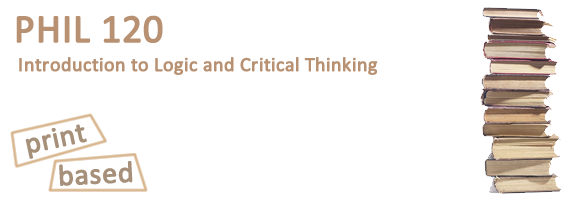
Course Outline
Mode of Delivery
This is a print-based, correspondence course.
Course Description
Philosophy 120: Introduction to Logic and Critical Thinking provides the tools for dealing with both everyday and more technical arguments and concepts. Analysis and resolution of confusions, ambiguities, and fallacies.
Intended Audience
The course is intended for students at all levels of university study who wish to become clearer about the logical structure of natural language—or at least English, not to beg a question. The course will also provide some opportunity to conquer an aversion to formal work—the ‘I can’t do math’ syndrome. However, no mathematical knowledge is either assumed or required in the course.
Course Goals
There are theoretical and practical aims in this course. It is hoped that any one of them might be sufficient to spark your interest.
- At a philosophical level, a goal of the course is to rouse in your mind the question of the extent to which relationships between truth-conditions of sentences can be captured by structural (or grammatical, or syntactic) relationships between the sentences. This issue is closely connected with questions about the nature of thought and the possibility of thinking machines.
- On a practical level, a goal is to get clear on the semantic properties of terms that have the broadest currency in the language, i.e., logical terms. These are words that are not peculiar to any one of the several sciences but are common and essential throughout every branch of knowledge. Further, you should acquire a firm intuitive grasp of the notion of a valid, or deductively sound, argument. Although such arguments in pure form may not be the most interesting that one encounters in a particular discipline (outside of mathematics and theoretical physics), the notion is fundamental to all rational discourse.
- Finally, a goal that is perhaps both practical and theoretical: it is hoped that you will acquire
a better grasp of, and appreciation of, the structure and semantics of (at least) English. This is achieved by introducing an artificial language and reflecting, as it were, English off of it. It this seems bizarre at first blush, one might have experienced, or recall someone having remarked, that they did not understand the grammar of their own language until they learned another. The situation with our artificial language is not much different.
Course Materials
Your course material consists of a course manual that contains ten lessons with commentary by the course author on key topics, directions for doing reading and exercises, and the graded assignment problems.
Course Work
There will be twelve assignments, each graded on the basis of ten. Of these twelve, the best ten will be counted toward the final grade, for a total of 100 points. There will be an “open book” midterm (15 points) and a final (85 points), i.e., 200 possible points. Your final grade will be a percentage of this total.
Required Textbooks and Course Materials
- Hodges, Wilfrid. Logic: An Introduction to Elementary Logic. 2nd ed. Harmondsworth: Penguin Books, 2002.
- PHIL 120 Learner Package (includes course manual)
